|
|
|
Sort Order |
|
|
|
Items / Page
|
|
|
|
|
|
|
| Srl | Item |
| 1 |
ID:
145968


|
|
|
|
|
| Summary/Abstract |
In July 1967, Hannah Arendt wrote to the editor of the New Yorker, William Shawn, to praise Jonathan Schell’s recently published report on Ben Suc, a village of several thousand people along the Saigon River that the American military had recently encircled, bombed, occupied, searched, evacuated, burned, bulldozed, and bombed again. Most of the surviving villagers had been trucked to a hastily constructed relocation camp. Under a ‘long nylon canopy over the bare earth, without floors or walls’, ringed by barbed wire, ‘each family was assigned a place about ten feet square’ to inhabit, along with their pigs and chickens; a sign under the canopy welcomed them to ‘the reception center for refugees fleeing communism’ (Schell, 1967: 69, 74). ‘Nothing else I read has the same immediacy’, she told Shawn, adding that ‘compared with this nylon-concentration camp’, the French internment camp where she had been imprisoned in 1940 ‘was sheer luxury’.
|
|
|
|
|
|
|
|
|
|
|
|
|
|
|
|
| 2 |
ID:
145972
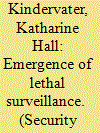

|
|
|
|
|
| Summary/Abstract |
This article examines the history of the development of drone technology to understand the longer histories of surveillance and targeting that shape contemporary drone warfare. Drawing on archival research, the article focuses on three periods in the history of the drone: the early years during World Wars I and II, the Cold War, and the 1990s. The history of the drone reveals two key trends in Western warfare: the increasing importance of intelligence, surveillance, and reconnaissance (ISR) and the development of dynamic targeting. These trends converge today in a practice of lethal surveillance where ISR capabilities are directly linked to targeted killing, effectively merging mechanisms of surveillance and knowledge production with decisions on life and death. Taking this history of lethal surveillance into account not only reframes current debates on drone warfare, but also connects the drone to other practices of security and control.
|
|
|
|
|
|
|
|
|
|
|
|
|
|
|
|
| 3 |
ID:
145973
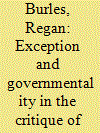

|
|
|
|
|
| Summary/Abstract |
This article investigates the relation between exception and governmentality in the critique of sovereignty. It argues that the problem of sovereignty is not only expressed between the accounts of sovereignty that exception and governmentality articulate, but also within each of those accounts. Taking Michel Foucault and Carl Schmitt as the paradigmatic theorists of governmentality and exception, respectively, this article engages in close readings of the texts in which these concepts are most thoroughly elaborated: Security, Territory, Population and Political Theology. These readings demonstrate that the spatiotemporal expression of the problem of sovereignty within exception and governmentality renders these concepts indistinguishable from one another in terms of their relation to the boundaries of political order. Schmitt and Foucault’s accounts of sovereignty should thus not be read as opposites, but as expressions of the limits of modern political authority. Efforts to develop a critique of sovereignty through typologies of exception or governmentality are bound to reinstantiate the spatiotemporal limits expressed by the principle of state sovereignty.
|
|
|
|
|
|
|
|
|
|
|
|
|
|
|
|
| 4 |
ID:
145970
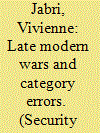

|
|
|
|
|
| Summary/Abstract |
Patricia Owens’s (2015) Economy of Force is one of the most thought-provoking and engaging interventions in recent discourses on war, conflict and security practices. Its central claim is that liberal interventionism, and in particular operations conducted in places such as Iraq and Afghanistan, might be understood in terms of what Owens understands as the ‘ontology of household rule’. Using ‘counterinsurgency’ as a case study, Owens’s wider aim is to provide a critique of the ‘rise of the social’ or ‘sociolatory’ in political and international theory. So enamoured are discourses in politics and international relations with ‘the social’, she suggests, that it is taken for granted as a category of explanation in the absence of any serious attempt at a historical explanation of the rise of the social and ‘the household’ as its fundamental ontology.
|
|
|
|
|
|
|
|
|
|
|
|
|
|
|
|
| 5 |
ID:
145971


|
|
|
|
|
| Summary/Abstract |
Economy of Force is not about the ‘economics of war’, or not in any straightforward sense. Rather, it retrieves the older, but surprisingly neglected, history and theory of oikonomia, the ancient Greek term for ‘household governance’. The book is a study of oikonomia in the use of military force, but also as underlying distinctly social forms of governance more broadly. There is a very long tradition of thinking about households-as-government and a great deal of scholarship in literary and gender studies on practices and ideologies of domesticity. Oikonomia is the origin of the language of modern ‘economics’, but more importantly and revealingly almost all writing about government in the West. International and much political theory is out of touch with these literatures, which has resulted in blindness to a crucial reality about modern governance forms. The large-scale household administration of life processes plays a remarkably central role in international and imperial relations.
|
|
|
|
|
|
|
|
|
|
|
|
|
|
|
|
| 6 |
ID:
145967
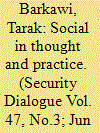

|
|
|
|
|
| Summary/Abstract |
In Economy of Force (2015), Patricia Owens has produced original scholarship of the first order. She recovers the discourse of household rule that has informed modern social thought. Readers of Security Dialogue and those who work in critical security studies will find her work of special interest. International relations scholars have typically turned to social theory as a source of critical insight for leverage in an intellectually and politically conservative discipline. Security Dialogue has been an important forum for such work, where disciplines influenced by social theory, from sociology to political economy, have been brought to bear on questions of security. Owens, by contrast, lays bare the hidden conservative politics behind much social theorizing. For her, social thought seeks to domesticate social disorder.
|
|
|
|
|
|
|
|
|
|
|
|
|
|
|
|
| 7 |
ID:
145974
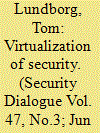

|
|
|
|
|
| Summary/Abstract |
During the last couple of decades, the virtual has emerged as a forceful conceptual tool in security studies. While used primarily in order to question assumptions about an objective truth concerning the meaning and value of security and different forms of insecurity, the implications of drawing on this concept vary considerably depending on how the virtual is conceptualized, and specifically how the potentiality of the virtual is linked to the process of actualization. Turning to the philosophies of Baudrillard, Agamben and Deleuze, as well as key thinkers in contemporary security studies, this article delineates three different approaches to analysing the virtualization of security. Focusing in particular on how these approaches point to contending views of ‘capture’ and ‘resistance’, it is argued that the choice of approach has serious implications for grasping what is at stake politically in the process of virtualization. These implications relate, more precisely, to how the virtual opens up and/or closes down the spaces of resistance that the modern subject of security traditionally has relied upon. In this way, the virtualization of security not only is important for thinking about capture and resistance, but challenges the very ground on which the modern subject of security rests.
|
|
|
|
|
|
|
|
|
|
|
|
|
|
|
|
| 8 |
ID:
145969


|
|
|
|
|
| Summary/Abstract |
Patricia Owens’s remarkable Economy of Force (2015) traces the counterinsurgency strategies used by the British and US empires from Malaya to Afghanistan. If this were all the book was about, though, it would not be so remarkable. What makes it remarkable is that, more than a history of postwar counterinsurgencies, Economy of Force directs our attention to two deeper relationships that have gone unnoticed in existing scholarship. The first is the relationship between counterinsurgency campaigns and uniquely social modes of thought. Counterinsurgency campaigns deployed social theory both to explain why insurgents rebelled and in their efforts to prevent it.
|
|
|
|
|
|
|
|
|
|
|
|
|
|
|
|
|
|
|
|
|